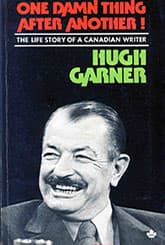Hugh Garner
Critique • Views and quotes

Born
Batley, England, 1913
Died
Toronto, 1979
Publications
Novels, stories, memoirs, radio scripts, screenplays, essays
Genres
Literary, crime, mystery, journalism
Writing language
English
Place of writing
Canada
Novels
• Cabbagetown (1950)
Stories
• "The Yellow Sweater" (1951)
sCanadian Literature
• Cabbagetown (1950)
• Hugh Garner's Best Stories (1963)
The tough guy of Canadian letters
A fighting, hard-drinking, hard-living writer, Hugh Garner would have fit the stereotype of an American novelist in the 1920s and '30s. He certainly didn't fit in with the effete Canadian writers of the mid-century, who seemed to be either English professors or poets of exquisite sensibility who had turned to prose. Canadian literary circles didn't know what to make of Hugh Garner.
For his writing was as Canadian as it gets. Forget trendy ideas of the northern siege mentality, of survival, of the unforgiving landscape, and all that. Garner had no such grand conception of his art. He wrote about the people, places and events he knew—without frills. And, since Canadian people and places were what he knew, his work ended up portraying Canadian life, especially in the inner cities, better than almost anyone else during his time. His best work though is of interest to readers around the world.
Garner was born in England, his parents moving to Canada in 1919. He grew up in the poor neighbourhoods of Toronto, rode the rails in Canada and the United States during the Depression, joined the International Brigades in the Spanish Civil War, and later served in the navy in World War II. He wrote about all these experiences.
His first published serious novel was entitled Landlubber Lying Down Below, until his publishers changed it to Storm Below (1949). It followed the men aboard a ship for six days during the war. His most acclaimed work, Cabbagetown, about the desperate escapades of young men and women in Toronto's famous slum during the depression, was first published in abridged form in 1950 and restored to its full length in 1968. Other novels from this era include Silence on the Shore (1962), a sometimes awkward tale of characters in a boarding house.
But Garner made his biggest mark in the early part of his career with his short stories. "One-Two-Three Little Indians", "The Conversion of Willie Heaps", "One Mile of Ice", and others were printed in magazines, widely reprinted in anthologies, collected in books, and awarded prizes. An early collection, The Yellow Sweater (1952), was a commercial flop but Hugh Garner's Best Stories (1963) is a prize-winning, perennially popular selection of his early stories. Later collections are Men and Women (1966) and Violation of the Virgins (1971).
A non-conformist's life
In later years Garner turned to writing popular mystery novels, including The Sin Sniper (1970), Death in Don Mills (1975) and Murder Has Your Number (1978), featuring Toronto detective inspector McDumont.
He also returned to Cabbagetown in The Intruders (1976) with a novelistic examination of the affluent folks who had recently gentrified the area. But by this time Garner's alcoholic and carousing lifestyle were taking the edge off his critical faculties and his writing had become cranky and sloppy. (One of his most famous quotes came from an earlier introduction to a collection: "There is no other job for which I was so fitted psychologically and temperamentally, and no other career which would have interfered less with my drinking." But I suspect the interference ran in the opposite direction.)
His most enjoyable reading from his late years may be One Damn Thing After Another! (1973), a memoir of a non-conformist writer's life, stitched together from previously published journalism and new observations—from the author of seventeen books, a hundred stories, four hundred magazine articles and essays, ten television dramas, numerous radio dramas and a stage play.
Writer and editor Paul Stuewe, who admirably completed Garner's last unfinished work (the mystery novel Don't Deal Five Deuces, 1992), has also produced a biography, The Storms Below: The Turbulent Life and Times of Hugh Garner (1988), which reads as excitingly as Garner's best novels.
— Eric
Critique • Views and quotes

